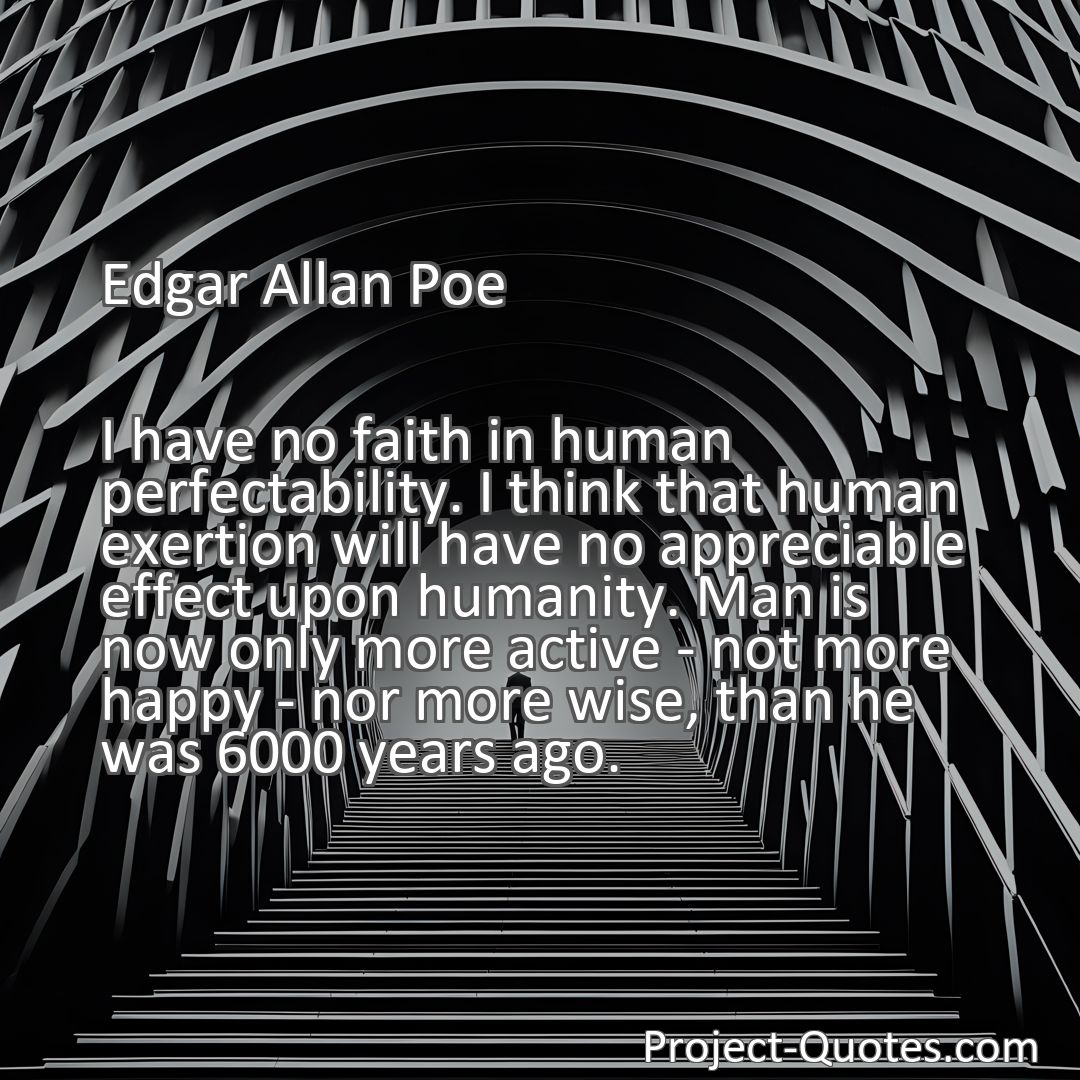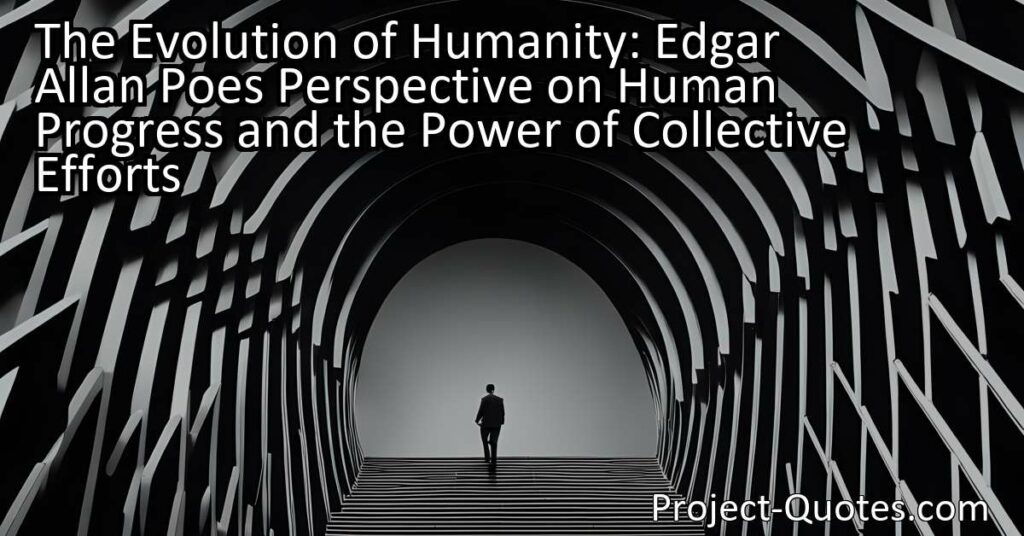I have no faith in human perfectability. I think that human exertion will have no appreciable effect upon humanity. Man is now only more active – not more happy – nor more wise, than he was 6000 years ago.
Edgar Allan Poe
In this essay, we explore Edgar Allan Poe’s perspective on human progress and the power of collective efforts. Poe’s skepticism about human perfectability is grounded in his observation that despite advancements in technology and industry, mankind’s ultimate goal of improved happiness and wisdom remains elusive. However, it is crucial to acknowledge the ingrained desire for improvement that permeates society and the power of collective action in reshaping societies and molding the course of humanity. By reflecting on the wisdom of the past, we can strive for genuine progress that brings true happiness and wisdom to humanity.
Table of Contents
- 1 I have no faith in human perfectability. I think that human exertion will have no appreciable effect upon humanity. Man is now only more active – not more happy – nor more wise, than he was 6000 years ago.
- 2 Edgar Allan Poe
- 3 Meaning of Quote – I have no faith in human perfectability. I think that human exertion will have no appreciable effect upon humanity. Man is now only more active – not more happy – nor more wise, than he was 6000 years ago.
- 4 Freely Shareable Quote Image
- 5 Related
Meaning of Quote – I have no faith in human perfectability. I think that human exertion will have no appreciable effect upon humanity. Man is now only more active – not more happy – nor more wise, than he was 6000 years ago.
The Evolution of Humanity: Exploring Edgar Allan Poe’s Perspective on Human Progress
Introduction :
Infused with wisdom and poetic expression, Edgar Allan Poe’s quote, “I have no faith in human perfectability. I think that human exertion will have no appreciable effect upon humanity. Man is now only more active – not more happy – nor more wise than he was 6000 years ago,” sparks a thought-provoking discussion surrounding the progress of humanity. In this essay, we delve into the depths of Poe’s pessimistic belief about human perfectibility and examine the notable advancements and stagnations throughout history. While Poe’s view may seem bleak, it provides us with an opportunity to reflect upon our own deeds and reconsider the trajectory of our society.
Body:
I. Understanding Poe’s Perspective :
To fully grasp Poe’s perspective on human progress, it is crucial to explore the context in which he lived and observed mankind. Born in the early 19th century, Poe witnessed the onset of the Industrial Revolution, a time characterized by rapid advancements in technology and industry. However, amidst these changes, the author questioned whether these developments truly brought genuine happiness or wisdom to humanity.
Poe’s skepticism about human perfectability stemmed from his observation that despite the numerous inventions and the acceleration of human activity, mankind’s ultimate goal of improved happiness and wisdom remained elusive. He believed that humanity’s essence had not fundamentally changed over thousands of years, rendering any exertion towards progress futile in his eyes. Rather, humans appeared to be caught in a cycle of incessant activity, incessant but not happier or wiser.
II. The Pervading Desire for Perfection :
While Poe’s perspective on human perfectability may be grounded in skepticism, it is essential to acknowledge the ingrained desire for improvement that permeates society. Throughout history, humanity has demonstrated an inherent need for progress and the pursuit of perfection, whether it be advancements in science, medicine, or social equality.
Admittedly, the road to progress has been fraught with setbacks, including wars, conflicts, and injustice. However, these obstacles have also been catalysts for change, ultimately leading to social, cultural, and technological advancements. Consider the abolition of slavery, the women’s suffrage movement, or the groundbreaking discoveries in fields such as medicine and space exploration. These moments in history exemplify the human spirit’s indomitable nature and its perpetual quest for improvement.
III. The Power of Collective Efforts :
Poe’s assertion that human exertion has no appreciable effect upon humanity overlooks the immense power inherent in collective efforts. History has demonstrated that when humans join forces to tackle shared challenges, remarkable achievements often follow.
Whether it is in the form of grassroots activism, social movements, or international collaborations, the power of unity has the potential to reshape societies and mold the course of humanity. The Civil Rights Movement in the United States, for instance, brought about significant social and legal changes while promoting equality and justice. Similarly, global efforts to combat climate change have sparked widespread awareness and initiated policy changes to mitigate the environmental crisis.
Moreover, the evolution of technology has amplified the influence of human exertion. Communication platforms and social media have facilitated the spread of ideas and strengthened connections among like-minded individuals, enabling them to challenge prevailing norms and rally for positive change. These interconnected networks have the potential to harness the power of collective action, thereby altering the trajectory of humanity for the better.
IV. The Wisdom of the Past :
While Poe may have doubted humanity’s progress over the last 6000 years, there is immense knowledge to be gained from the wisdom of the past. The accumulation of knowledge, experiences, and historical lessons provides a foundation upon which future generations can build.
By studying the mistakes and triumphs of our ancestors, we can avoid repeating past errors while embracing effective strategies for progress. For instance, the wisdom gained from past conflicts can shape strategies to navigate contemporary geopolitical challenges. Similarly, the lessons learned from environmental degradation can guide us toward sustainable practices and the preservation of our planet.
Conclusion :
Edgar Allan Poe’s skeptical perspective on human perfectability invites us to reflect on the progress of humanity. While his perspective may seem pessimistic, it serves as a reminder of the constant need for self-reflection and evaluation of our collective efforts. It is through the examination of our history, the power of collective action, and the wisdom of the past that we can strive for genuine progress progress that brings not only material advancements but also true happiness and wisdom to humanity.
I hope this quote inspired image brings you hope and peace. Share it with someone who needs it today!


